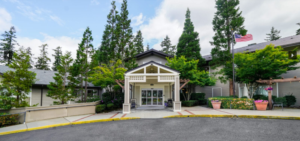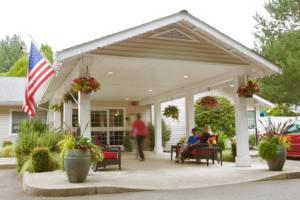Assisted Living in Seattle, Washington: Search Near You, How To Pay, Licensing, Local Resources, and Questions To Ask
Seattle, Washington, offers a variety of residential assisted living communities that provide personalized care, comfortable accommodations, and enriching social opportunities for older adults. Washington ranks among the top states for senior care quality, ensuring that assisted living facilities meet high standards of safety, support, and well-being. With access to excellent healthcare, scenic waterfront views, and a vibrant cultural scene, Seattle’s assisted living communities provide an inviting and supportive environment for those 55 and older.
Assisted Living Communities near Seattle, Washington

Overlake Terrace
Redmond, Washington 98052

Aegis Living Issaquah
Issaquah, Washington 98027

Belle Harbour
Bellevue, Washington 98004

Harbour Pointe Senior Living
Mukilteo, Washington 98275

Franke Tobey Jones
Tacoma, Washington 98407

Aegis Living Madison
Seattle, Washington 98112

Aljoya Thornton Place – Era Living
Seattle, Washington 98125

The Lakeshore Retirement Community – Era Living
Seattle, Washington 98178

Ida Culver House Broadview – Era Living
Shoreline, Washington 98133

University House Issaquah – Era Living
Issaquah, Washington 98029

About Assisted Living In Seattle, WA
In Seattle, Washington, residential assisted living is a long-term care option designed for older adults who need assistance with daily activities while maintaining their independence. These communities provide essential services such as help with bathing, dressing, medication management, and mobility support, ensuring residents receive personalized care. Additional amenities often include meal preparation, housekeeping, transportation, and social activities to enhance quality of life. Assisted living facilities in Seattle are regulated by the state to ensure high standards of care, safety, and resident well-being. With a focus on comfort, dignity, and engagement, Seattle’s assisted living communities offer a supportive environment for those 55 and older seeking a balance between independence and assistance.
Considerations when looking for Senior housing in Seattle, WA
There are 46 assisted living communities in Seattle, Washington. The estimated population of Seattle is 755,078 with 12.8% of that number being those ages 65 and older. In Seattle, the summers are short, warm, dry, and partly cloudy and the winters are very cold, wet, and mostly cloudy. Over the course of the year, the temperature typically varies from 37°F to 79°F and is rarely below 28°F or above 88°F.
Cities near Seattle, WA
- Bellevue, WA – 10 miles east
- Shoreline, WA – 11 miles north
- Renton, WA – 12 miles southeast
- Lynnwood, WA – 16 miles north
- Kent, WA – 19 miles south
Pricing and How to Pay for Assisted Living
Paying for senior care depends on several factors. On average, residents can expect to pay $7,650 per month for assisted living services. These fees encompass personalized care, engaging activities, and comfortable accommodations, ensuring a fulfilling retirement experience. Keep in mind these costs may fluctuate depending on factors such as location and facility amenities.

You want to consider your payment options for assisted living, memory care, and care homes. For these services, Medicare is NOT an option for payment.
The most common payment for these services would be out of pocket Private Pay and assessing a combination of retirement funds, personal savings, and pension payments.
Medicaid can also be an option, be sure to see if you or a loved one qualifies.
Long-Term Care insurance is also a possible option in cases of chronic conditions, be sure to see if you or a loved one qualifies.
For our Veterans and spouses of veterans, be sure to assess Veteran Aid and your eligibility for these benefits.
Medicare – NO:
- Medicare does NOT pay for Assisted Living.
- People 65 years and older and individuals with end stage renal disease are eligible for Medicare benefits, no matter their income.
- Coverage is meant for people in need of short-term care.
Private pay – YES:
- Many families pay for assisted living with private funds.
- Private pay can be a combination of retirement funds, personal savings, and pension payments.
- Family members may contribute funds to pay for assisted living or other senior housing and care.
Medicaid – MAYBE:
- Medicaid provides health coverage to millions of Americans. Eligible participants include: low-income adults, elderly adults and people with disabilities.
- Medicaid is administered by state, according to federal requirements. The program is funded jointly by each state and the federal government.
- Every state has their own individual Medicaid assistance program.
- National guidelines are in place do decipher how states must spend Medicaid money, but with allowances toward the guidelines.
- The state determines what levels of care will be covered by Medicaid, who is eligible, and how much the state will reimburse the care community.
- If you are unsure whether you qualify for Medicaid, you should apply. You may be eligible depending on your household income, family size, age, disability and other factors.
Long-term Care Insurance – MAYBE:
Long term care insurance is a great way to pay for assisted living, and planning ahead is important when considering how to pay for senior housing and care. Nearly 75% of people over the age of 65 will require long-term care and services at some point. Buying into long-term care insurance when a person is in their 50s and 60s is the most common time to do so.
- Long-term care insurance helps cover the costs of chronic medical conditions.
- Individuals and couples with the ability to pay into long-term care insurance have the advantage of a head start in allocating funds for senior care.
Veteran Aid and Assistance – MAYBE:
This benefit is available to some military veterans and surviving spouses who live in an assisted living community and those who have in-home care.
- There are specific guidelines, but a veteran may qualify for as much as $2,050 each month.
- A veteran with a sick spouse may be eligible for $1,600 per month.
- If a veteran has passed, their surviving spouse can qualify for $1,300 per month.

Local Hospitals and Healthcare Providers in Seattle, WA
Harborview Medical Center
- Address: 325 9th Ave, Seattle, WA 98104
- Phone: 206-744-3000
Virginia Mason Medical Center
- Address: 1100 9th Ave, Seattle, WA 98101
- Phone: 206-624-1144
Swedish Medical Center – First Hill Campus
- Address: 747 Broadway, Seattle, WA 98122
- Phone: 206-386-6000
UW Medical Center – Montlake
- Address: 1959 NE Pacific St, Seattle, WA 98195
- Phone: 206-598-3300
Swedish Medical Center – Cherry Hill Campus
- Address: 500 17th Ave, Seattle, WA 98122
- Phone: 206-320-2000
Questions to Ask
Finding a senior living community can be overwhelming. Here are some tips on things to be observant of:
- Make sure the facility is clean and well maintained. You can tell a lot about the operation by noting what is clean and maintained. Are doorknobs loose or damaged? Do you see any frayed carpet or trip hazards?
- Visit during lunch hour to observe what the residents are eating. Ask questions about the nutrition program. Is there diversity in meals, healthy fruits and vegetables served at all meals, drink options?
- Speak to residents and/or family members to learn their perspective.
- Ask about staff and resident engagement. Get a feel for how staff interact with residents.
- Ask about the life enrichment programs. Activities are crucial when it comes to quality of life and play a key role in care for older adults.
- And finally (along with a plethora of more things to consider), get to know the leadership in the building. If you feel good around the Executive Director, Head Nurse, Lead Activities Director and even the Chef or Janitor, it is a good sign you can trust them with the care of your loved one.
Resources and Links – Washington
Community Living Connections For people who are looking primary for Information and assistance line for people facing aging and disability issues.
Washington State Long-Term Care Ombudsman Program – Promotes and protects the rights of long-term care residents living in licensed care facilities with the assistance of trained volunteers, the Ombudsman investigates and resolves complaints made by or on behalf of residents, and identifies problems that affect a substantial number of residents.
Adult Protective Services (APS) For those who are looking to contact APS for reports on allegations of abandonment, abuse, financial exploitation, neglect, or self-neglect of vulnerable adults living in the community and in facilities.
Department of Social and Health Services Adult Abuse and Prevention A Department we are tied together by a single mission: to transform lives. Each administration within DSHS has a refined focus on this mission. Individually we have the following missions to transform lives by promoting choice, independence and safety through innovative services.
Office of Insurance Commissioner, Statewide Health Insurance Benefits Advisors (SHIBA)– SHIBA has volunteers who can help you with your health care coverage questions. You get free, unbiased and confidential education and assistance.
Eldercare Locator This is a great resource to search for specific care in specific counties and cities. This database is a nationwide resource that connects older Americans and their caregivers with trustworthy local support resources. Connect with services such as meals, home care or transportation, or a caregiver education or respite from caregiving responsibilities. The Eldercare Locator is a public service of the Administration on Aging (AoA), an agency of the U.S. Administration for Community Living.
Medicare provides a search feature to find & compare providers near you, most senior housing and care providers are included on CareAvailability.com. Find & compare plans in your area. Determine if you qualify for premium savings
Medicaid offers information on how to apply for Medicaid, eligibility criteria, links to local state offices, and additional resources
The Alzheimer’s Association is the leading voluntary health organization in Alzheimer’s care, support, and research. Whether you are living with Alzheimer’s or caring for someone with the disease, information and resources are available.
